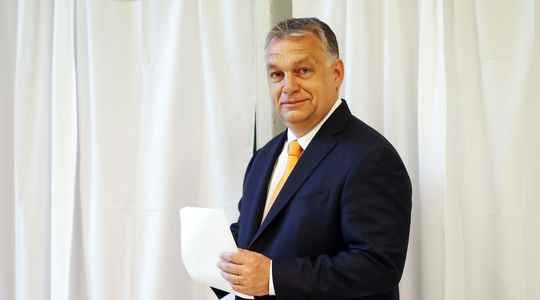Every March 15, the Magyars adorn themselves with red-white-green cockades. On this national holiday, Hungary celebrates its 1848-1849 uprising against Habsburg rule. Vienna suppressed the bourgeois revolution with the help of the tsarist army of Moscow. This year, Putin’s offensive in Ukraine permeated the gatherings of supporters of Viktor Orban and Péter Marki-Zay, his opponent, who intends to deprive him of a fourth consecutive mandate in the legislative elections of April 3.
This election already looked like a referendum around the “National Cooperation System”, a screen for the authoritarian conservative revolution led by Orban since his conquest of power in 2010. Today it takes on the appearance of a choice between anchoring Western Hungary and the opening towards the East – the martingale of the executive. “Putin or Europe?” question opposition placards in the streets of Budapest. And for good reason. Under the thumb of Fidesz, the party in power for more than eleven years, Budapest has become one of Moscow’s privileged partners on the Old Continent, even if it means undermining the European Union and NATO from within. For the outgoing leader, there is no question, in particular, of giving up Russian gas.
Compliant interviews
“The gayest barrack in the socialist camp” under the Soviet era, Viktor Orban’s Hungary is today the perfect copy of Vladimir Putin’s Russia and the personification of power. Every Friday morning, around 7:30 a.m., on public radio Kossuth, the Hungarian leader unfolds his messages during a complacent interview. As the Russian president, “Viktor”, aided by his oligarchs, confiscates the economy, relies on a servile media empire and stigmatizes NGOs and LGBT people, who have become the targets of a referendum on the “protection of the family”. .
Like the master of the Kremlin, the outgoing Prime Minister controls a state-party whose balance depends only on him. “Viktor Orban has built a personal and authoritarian state where he decides alone. The Prime Minister has everyone in his pocket, strong in the legitimate approval of voters and his own ‘clientele’, believes journalist Andras Dezso, of the ‘weekly LVH. An electoral failure would not smash Fidesz’s economic nomenklatura to pieces. However, Orban is such a center of gravity that all this political construction would go down the drain without him.”
On his land, Orban oversees a kleptocracy that outrageously favors his childhood friend, Lorinc Mészaros, formerly a heating technician, who has become one of the wealthiest men in the country. The ultra-conservative Constitution adopted in 2012 and the anti-migrant fence of 2015 shaped the international notoriety of “Viktor”, champion of the radical rights, admired by Donald Trump, Jair Bolsonaro and Matteo Salvini. Last fall, Eric Zemmour and Marine Le Pen disputed the anointing of Orban in the Hungarian capital. The National Rally candidate won the timpani, obtaining a loan of 10.6 million euros from a bank belonging to Meszaros.
Sometimes homely, sometimes messianic, Orban seduces “ordinary Hungarians” with his exaltation of the deep country and his popular humor. Entrepreneurs and landowners in the provinces also adhere to the eloquence of the “guy from Felcsut”, who bewitches his flock by glorifying the traditional family as much as he demonizes the opposition, beats Brussels and vilifies George Soros, who nevertheless financed Fidesz and part of his studies… Political Janus, Orban pleads for the reception of Ukrainians while he blocked the Syrians in 2015 with barbed wire. And all his contradictions do not prevent his followers from following him. “Fidesz’s story is very suitable for 2.5 – even 3 million Hungarians [NDLR : soit le tiers de la population], points out the analyst Gabor Török. Orban and his party give them what they want by hammering what they think. This style polarizes opinion so much that there is no chance that a Fidesz voter will join the opposition. No one deserts.”
Wise Old Pose
The municipal elections of October 2019 had eroded the hegemony of Fidesz, dispossessed of 10 of the 23 main cities of the country, including the capital Budapest. Following this setback, Orban and his political camp intensified their presence on social networks. On Facebook, “Viktor” floods his 1.2 million subscribers with videos. The many media subservient to the regime also hammer the speech of the executive. On a single day, public television M1 broadcast Viktor Orban’s March 15 speech nine times. Péter Marki-Zay, he was only entitled to five tiny minutes of airtime to present his program …
Will this be enough to ensure victory for the current Prime Minister? A survey by the pro-government institute Nézopont gives him 49% of voting intentions against 41% for his rival. Frightened by the war in neighboring Ukraine, the majority seek calm and stability. In this context, Orban improvises as a pacifist, sending back the “hammer” of Moscow and the “anvil” of kyiv. On official posters, he calls to “preserve” the “peace” and “security” of the country. But behind this wise old posture, “Viktor” intends above all to keep his leadership. And it went well. “Fidesz is inseparable from Viktor Orban, from his authority, his successes and his victories. Orban is the undisputed leader of the right and he will remain so, even if he loses”, claims political scientist Gabor G. Fodor, l one of the “evening visitors” of the Magyar leader.
In fact, the ultraconservative leader took his precautions. In December 2020, his “lieutenants” brought together Hungarian companies and institutions into a vast network of “friendly” foundations – a way to keep his allies mobilized, even in the event of defeat. On March 10, finally, his protege Katalin Novak became President of the Republic, ensuring the leader of Fidesz some control over the executive until 2027. Even if Peter Marki-Zay dethroned him on April 3, Orban and its shadow will long hang over Hungarian politics.
